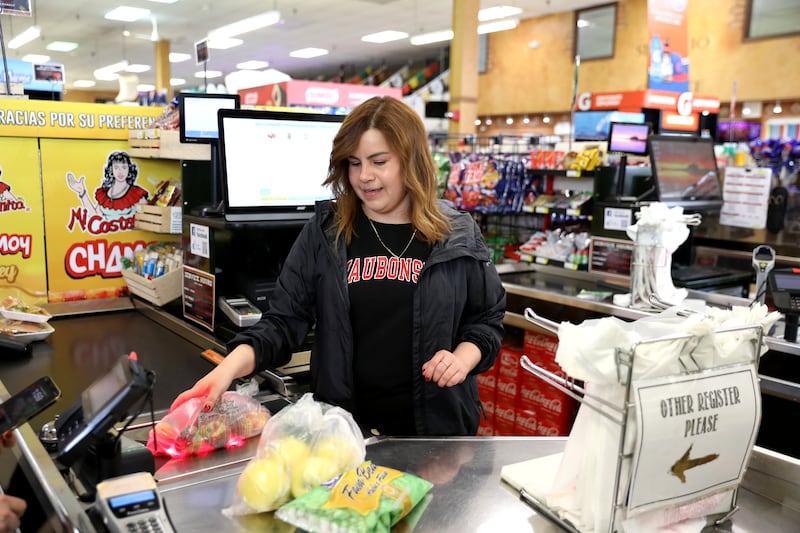Most Kane County municipalities already have decided to continue collecting the 1% grocery tax after the state lets it sunset at the end of 2025.
St. Charles will have to make its decision soon if it wants to continue to receive about $2 million in annual revenue.
Laz Marquez, owner of La Huerta in St. Charles, thinks letting the grocery tax sunset would put his business and other grocery stores in St. Charles at an advantage and benefit the city.
“I personally think St. Charles would be better off not imposing the tax,” Marquez said. “It’s more than just math. It’s more than just revenue. It’s also quality of life. ... I think St. Charles would be wise to pass on that tax and instead enjoy the benefits of additional volume coming in from surrounding cities.”
La Huerta is the only family owned grocery store in St. Charles after Blue Goose shuttered in 2022. Owner Laz Marquez and his sister, Josie Marquez, have been working in the store at 580 S. Randall Road since their parents opened it 20 years ago.
:quality(70)/cloudfront-us-east-1.images.arcpublishing.com/shawmedia/MQK3CRZOPVAGRKEYOSURW6TJPU.jpg)
The St. Charles market is one of nine stores in Illinois owned by the Marquez family. The first La Huerta opened in Addison in 1981.
When announcing the sunsetting of the grocery tax, Gov. JB Pritzker gave every municipality in Illinois the option to implement their own grocery tax and even provided municipalities with sample ordinances. Each local tax enacted will be identical to the state tax as the language in the municipal ordinances mirrors the state statute.
Municipalities have until Oct. 1 to approve their own ordinances if they wish to implement the tax by the first of next year.
So far, St. Charles has not taken up the issue. The only mention of the tax in open session came from a former resident during the public comment portion of the May 5 City Council meeting.
Former resident Dylan Sharkey suggested during public comment that having the only grocery stores in Kane County without the tax would put St. Charles at an advantage and bring shoppers from neighboring communities.
Sharkey is a graduate of St. Charles School District 303 and an editor for the Illinois Policy Institute.
Sharkey said grocery prices have risen 25% since 2020 and estimated a family of four would save about $200 a year without the 1% tax.
:quality(70)/cloudfront-us-east-1.images.arcpublishing.com/shawmedia/6G7PYIFA3RHE5JJ4E4S5QDYBWM.jpg)
“The grocery tax has never taken more out of families’ budgets than it does right now,” Sharkey said. “If you were going to give people a break on anything, I can’t think of a better thing than giving them a break on groceries right now.”
Marquez said he understands why local governments want to keep that stream of revenue, but suggested the increase in sales would outweigh the 1% rate decrease.
Batavia recently decided to impose the tax, joining more than 200 municipalities in the state, including Algonquin, Burlington, Montgomery, North Aurora, South Elgin and Sugar Grove in Kane County.
St. Charles and Geneva have not made their decisions.
Officials from municipalities that have enacted the ordinance cited the large amount of revenue they would lose without the tax as the main reason for imposing it.
St. Charles Mayor Clint Hull said while the decision is on city staff‘s radar, the formal review process has yet to begin. St. Charles stands to lose about $2 million a year without the tax, he said.
Hull said he understands both sides of the argument. He said while eliminating the tax would set St. Charles apart, the tax already has been in place and the revenue has been used to do a lot of good things.
Hull wouldn’t speculate as to whether a 1% tax discount would draw shoppers from neighboring communities to St. Charles, but said he was looking forward to hearing the perspectives of local business owners once the review process begins.
Marquez said because the Randall Road corridor allows shoppers to get from South Elgin to Geneva in minutes, Kane County shoppers are able to pick and choose where they spend their money.
“I know that nothing lasts forever,” Marquez said. “But I hope and I trust that the new administration will keep a good thing going. ... Once they’re gone, they’re gone. That’s it. You don’t get them back.”

:quality(70)/s3.amazonaws.com/arc-authors/shawmedia/5e395e17-6ee2-461c-8837-02706d64bc46.png)